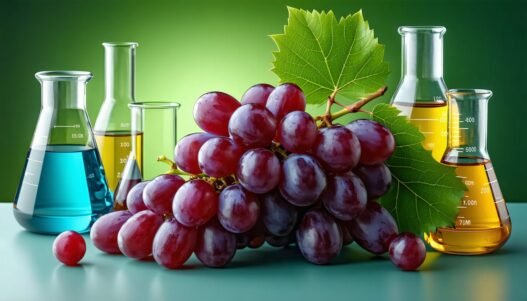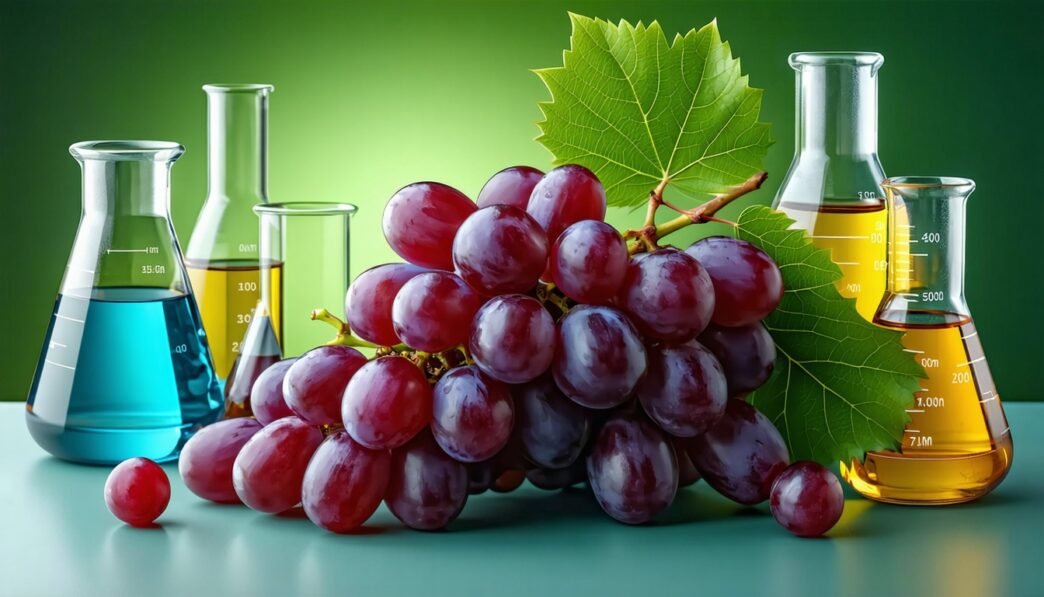Understanding Resveratrol
Introduction to Resveratrol
Resveratrol is a polyphenol compound that belongs to the stilbenoids group. This compound is found in over 70 plant species, including various human foods and red wines. Resveratrol is widely recognized for its high antioxidant potential and anticancer properties. It is commonly synthesized as a phytoalexin in plants as a response to various stimuli, such as mechanical injury, UV irradiation, and fungal invasions (NCBI). These qualities make resveratrol a topic of interest among longevity and anti-aging enthusiasts.
Food Sources of Resveratrol
Certain foods and drinks are excellent sources of resveratrol. These include:
| Food Source | Resveratrol Content (mg per 100g) |
|---|---|
| Red Grapes | 0.24 – 1.25 |
| Red Wine | 0.1 – 14.3 |
| Blueberries | 0.04 – 0.09 |
| Peanuts | 0.01 – 0.21 |
| Dark chocolate | 0.39 – 1.12 |
Resveratrol is believed to help reduce inflammation, lower LDL cholesterol, and prevent blood clot formation, which can lead to heart disease. It also plays a significant role in preventing insulin resistance, potentially reducing the risk of diabetes. For more in-depth information on the specific health benefits of resveratrol, please refer to our article on resveratrol benefits.
For those interested in supplementation, there are various resveratrol supplements available in the market. Incorporating resveratrol-rich foods into one’s diet can also present opportunities for improving overall health and longevity. For a comprehensive overview of resveratrol-rich foods, see our guide on resveratrol foods.
Health Benefits of Resveratrol
Research on resveratrol has revealed a multitude of potential health benefits, particularly in the realms of cancer prevention, cardiovascular health, and inflammation management. These findings have attracted significant interest from longevity and anti-aging enthusiasts.
Cancer Prevention and Treatment
Resveratrol has demonstrated promising effects in cancer prevention and treatment. It exhibits bioactivities that may help combat cancerous cells and reduce tumor growth. Research has indicated that resveratrol’s antioxidant and anti-inflammatory properties contribute to its cancer-fighting abilities.
Numerous studies have explored these mechanisms, showing that resveratrol can inhibit the proliferation of cancer cells and promote apoptosis (cell death) in various cancer types.
| Cancer Type | Observed Effect |
|---|---|
| Breast Cancer | Inhibition of tumor growth |
| Colon Cancer | Reduced cell proliferation |
| Prostate Cancer | Induced apoptosis in cancer cells |
For a deeper exploration of resveratrol’s effects on cancer, see our article on resveratrol for cancer.
Cardiovascular Health Effects
Resveratrol appears to play a significant role in promoting cardiovascular health. It exhibits protective effects against blood vessel damage and lowers cholesterol levels. Additionally, resveratrol can help prevent blood clots, reduce high blood pressure, and aid in treating individuals with progressing cardiovascular conditions.
These cardiovascular benefits are essential for those at risk of heart disease. The following table highlights key benefits:
| Cardio Benefit | Description |
|---|---|
| Lowered Cholesterol | Reduces LDL (“bad”) cholesterol levels |
| Improved Circulation | Enhances blood flow and vessel function |
| Blood Pressure Control | Helps to manage elevated blood pressure |
For more details on how resveratrol contributes to heart health, check out our article on resveratrol for cholesterol and resveratrol for blood pressure.
Anti-inflammatory Properties
Resveratrol is also known for its powerful anti-inflammatory properties. It can target inflammation throughout the body, including in the brain, which may help mitigate conditions like Alzheimer’s disease and dementia. Research suggests that resveratrol may stabilize neurological biomarkers in Alzheimer’s patients, offering a potential therapeutic pathway.
The following table summarizes the anti-inflammatory effects of resveratrol:
| System Affected | Potential Impact |
|---|---|
| Brain | May help in stabilizing biomarkers for Alzheimer’s |
| Joints | Could reduce inflammation related to arthritis |
| General Inflammation | Aids in controlling inflammation levels |
For further insights into the anti-inflammatory benefits of resveratrol, explore our article on resveratrol for inflammation.
These findings underscore a growing body of evidence supporting the diverse health benefits of resveratrol, making it a valuable compound in the quest for longevity and improved well-being. For those interested in incorporating resveratrol into their health regimen, consider reviewing our articles on resveratrol supplements and resveratrol foods for further guidance.
Research on Resveratrol
Research on resveratrol continues to yield promising insights into its potential health benefits, particularly concerning blood vessel health, diabetes management, and longevity. This section explores the relevant findings in these areas.
Effect on Blood Vessel Damage
Resveratrol has demonstrated protective effects against blood vessel damage. It lowers cholesterol levels and contributes to the prevention of blood clots, which can help mitigate heart disease risk for those vulnerable and assist individuals with progressing cardiovascular conditions (WebMD).
Furthermore, the compound enhances nitric oxide production, regulates the renin-angiotensin system, and reduces oxidative stress. These mechanisms support arterial health and combat cardiac aging.
| Mechanism | Effect on Blood Vessels |
|---|---|
| Increased Nitric Oxide Production | Improves blood flow and reduces blood pressure |
| Modulation of Renin-Angiotensin System | Regulates blood pressure and fluid balance |
| Reduction of Oxidative Stress | Protects blood vessels from cellular damage |
Impact on Type 2 Diabetes
Research indicates that resveratrol may play a significant role in the management of Type 2 diabetes. It has been shown to improve insulin sensitivity, which can help regulate blood sugar levels. This effect, along with its anti-inflammatory properties, positions resveratrol as a beneficial supplement for individuals at risk of or currently managing diabetes (NCBI).
| Study Findings | Result |
|---|---|
| Insulin Sensitivity Improvement | Positive correlation with resveratrol supplementation |
| Inflammatory Markers | Significant reduction in markers associated with diabetes |
For more details on the specifics of resveratrol’s effects on diabetes, refer to our article on resveratrol for diabetes.
Longevity and Lifespan Studies
Recent studies have shown that resveratrol may have a positive impact on lifespan. In a study involving wild-type honey bees, resveratrol supplements administered in doses of 30 and 130 μM resulted in an increase in average lifespan by 38% and 33%, respectively, under normal oxygen conditions. These findings suggest potential applications of resveratrol in promoting longevity.
| Study | Lifespan Increase |
|---|---|
| Honey Bee Study | 38% (30 μM) & 33% (130 μM) |
Research on resveratrol provides a foundation for understanding its possible benefits in cardiovascular health, diabetes management, and longevity. These insights can guide individuals towards considering resveratrol as part of their health and wellness regimen. For further information on the health benefits of resveratrol, check out our article on resveratrol health benefits.
Resveratrol’s Mechanisms
Understanding the mechanisms by which resveratrol exerts its beneficial effects is crucial for appreciating its potential. This section examines the cellular responses to resveratrol and its pharmacokinetics.
Cellular Responses to Resveratrol
Resveratrol demonstrates a wide range of beneficial biological properties beyond its antioxidant and anticancer effects. It has cardioprotective, neuroprotective, anti-inflammatory, and antimicrobial activities. Resveratrol has been shown to lower inflammation, inhibit various pathogens, protect the heart from dysfunction, and improve neurological health by promoting mitochondrial functions and decreasing oxidative stress.
The effectiveness of resveratrol can vary based on the concentration used. At low concentrations, it acts primarily as an antioxidant, neutralizing free radicals and reducing oxidative stress. Conversely, at high concentrations, it may exhibit pro-oxidant effects, potentially promoting DNA damage, which could limit its safety for certain applications. This biphasic behavior can be harnessed for therapeutic impacts, particularly in treatments targeting specific types of cancer cells.
| Concentration | Effect |
|---|---|
| Low Concentration | Antioxidant (protects against oxidative stress) |
| High Concentration | Pro-oxidant (may promote DNA damage) |
Pharmacokinetics of Resveratrol
The pharmacokinetics of resveratrol illustrates its challenges regarding bioavailability. Although over 70% of resveratrol is absorbed, it undergoes rapid metabolism, leading to poor in vivo bioavailability. Resveratrol is subject to passive diffusion, forms complexes with transporters, and is metabolized in the liver into various products that retain some biological activity. This metabolic process contributes to both its beneficial and toxic effects within the body (PubMed Central).
The variability in individual response to resveratrol supplementation can be attributed to these metabolic pathways. Factors such as age, health status, and dietary components may also play roles in how effectively resveratrol may function in promoting health benefits such as those relating to resveratrol for heart health or resveratrol for diabetes.
| Parameter | Detail |
|---|---|
| Absorption Rate | Over 70% |
| Metabolism | Rapid, through liver pathways |
| Biological Activity | Retained in various metabolic byproducts |
Exploring these mechanisms helps elucidate why resveratrol is being investigated extensively, particularly within the realms of anti-aging and longevity. For more insights into its effects, consider reviewing information on resveratrol benefits and resveratrol supplements.
Considerations with Resveratrol
Understanding the considerations associated with resveratrol is essential for those interested in its potential health benefits, particularly its implications for longevity and anti-aging.
Bioavailability and Dosage
One of the significant challenges when it comes to resveratrol is its bioavailability. Despite being absorbed efficiently—over 70%—resveratrol is rapidly metabolized in the liver, leading to very low plasma levels after oral intake. For instance, studies have shown that dosages around 25 mg result in extremely low bioavailability, which can limit its effectiveness.
The bioavailability of resveratrol is influenced by various factors, including solubility and pH levels, which can affect its stability. Consequently, methods such as the development of nanocarrier-based delivery systems are being explored to enhance its therapeutic potential by improving solubility and retention time.
| Dosage Range | Bioavailability (% Absorbed) |
|---|---|
| 5 mg | Low |
| 25 mg | Extremely low |
| 100 mg+ | Variable based on formulation |
For individuals considering resveratrol supplements, discussing dosage with a healthcare provider is advisable to ensure effectiveness and safety. Further information can be found in our article on resveratrol dosage.
Potential Interactions with Medications
Resveratrol may interact with various medications, which is an important consideration for anyone taking prescribed treatments. Its effects on liver enzymes can influence the metabolism of other medications, potentially increasing or decreasing their effectiveness. For instance, resveratrol has shown potential to affect drugs used for cholesterol, blood pressure, and other conditions, necessitating caution.
Individuals taking medications for diabetes, hypertension, or anticoagulants should consult with their healthcare providers before starting any resveratrol supplementation. For more details on specific effects and considerations, explore our articles on resveratrol for cholesterol and resveratrol for diabetes.
In summary, while resveratrol offers exciting health benefits, its bioavailability and potential interactions with medications must be carefully evaluated to maximize its positive effects while minimizing risks.
Future of Resveratrol
Wider Applications Beyond Anti-aging
Resveratrol is primarily recognized for its anti-aging properties, yet its potential applications extend far beyond this domain. Over the last two decades, nearly 200 studies have evaluated resveratrol across various health issues, including cancer, menopause symptoms, diabetes, metabolic syndrome, and cardiovascular disease (PMC). Its extensive pharmacological activities make it a valuable compound in different fields of health.
For instance, resveratrol has exhibited beneficial effects in neuroprotection, where it shows promise in protecting against neurodegenerative diseases. Research indicates that resveratrol might enhance neurotransmitter secretion, increase the production of new neurons, promote neurogenesis in the hippocampus, and alleviate neuroinflammation and oxidative stress. This opens new avenues for utilizing resveratrol in cognitive health and potentially treating conditions like Alzheimer’s disease.
Latest Research Findings
Recent research has continued to uncover the diverse benefits of resveratrol. Investigating its mechanisms reveals both antioxidant and anti-inflammatory properties, reinforcing its role in promoting overall health. Studies highlight its capacity to improve heart function and manage cholesterol levels, making it relevant for cardiovascular health as well (resveratrol for cholesterol).
Of particular note, resveratrol’s effects on diabetes management have garnered attention. Its ability to improve insulin sensitivity and reduce blood glucose levels positions it as a promising candidate for diabetes treatments (resveratrol for diabetes).
Overall, the future of resveratrol research continues to look promising, with ongoing investigations into its suitability for various applications that extend beyond anti-aging. Researchers aim to further understand its dual role as both an antioxidant and a pro-oxidant, examining how this variability may influence its therapeutic efficacy under different conditions.
As findings progress, resveratrol might become a key player in holistic approaches to health, encouraging longevity and improved quality of life. For more insights into the health advantages of resveratrol, explore resveratrol health benefits or check out related topics such as resveratrol supplements and resveratrol for weight loss.





















